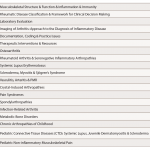Fundamentals of Rheumatology Course
The ACR is proud to announce the newest online offering: Fundamentals of Rheumatology Course. This course meets the needs of nurses, office managers, medical assistants, and other clinicians that are entering or returning to a rheumatology practice. It provides an overview of rheumatic disorders and insurance preauthorization. For more information, go to www.rheumatology.org/education/Prof MeetingCourses/frconlinecourse.asp.
Nurse practitioners (NPs), physician assistants (PAs), and other health professionals who have taken the ACR’s Advanced Rheumatology Course (ARC) find that specialized rheumatology training offers distinct benefits. Course participants cite enhanced caregiver–patient interactions, patient evaluations, patient education, and practice productivity as outcomes of the course.
The Advanced Rheumatology Course
The ARC is a series of 19 web-based modules offering in-depth knowledge of rheumatology along with practical clinical skills to physicians, fellows-in-training, nurse practitioners, physician assistants, and other clinicians who care for patients with or at risk for rheumatic disease and musculoskeletal conditions. Developed by leaders in the field of rheumatology, the ARC meets the need for comprehensive rheumatology training identified by the ACR and the ARHP.
The modules, divided into three tracks (adult, pediatric, and combined), feature four components:
- A preassessment of the participant’s knowledge of a specific rheumatology topic;
- A lecture presentation that includes audio-annotated PowerPoint slides;
- Clinical tip sheets that can be printed out to use in a clinic or practice setting; and
- A posttest to assess what a participant has learned.
Upon completion of the course, the graduate should be able to assess and manage patients with rheumatic diseases, outline the scope of practice of the healthcare professionals in managing rheumatic diseases, and describe the impact of rheumatic diseases on individuals and society.
Achieving these learning objectives enables graduates to incorporate the acquired knowledge and skills into their practices quickly with less on-the-job training time.
The specialized course is also designed to be convenient for enrollees. The online format allows individuals to participate from work, from home, or while traveling. With 12 months to complete the course, each individual can spend the time needed on each module with no specific required timeframe other than the individual’s personal schedule. But what do course graduates think of the training? The Rheumatologist spoke with several health professionals who have completed the ARC to see how the training has affected how they care for patients.
Positive Feedback from Graduates
Why take the course? Health professionals who complete the ARC have expanded their knowledge about rheumatology and have integrated their newly acquired knowledge and skill sets into their practice.
“When I was hired into a rheumatology practice, I realized I needed to widen my knowledge base and acquire new clinical skills for this field,” says Brandi Young, NP-C, an NP at North Mississippi Health System in Tupelo. Likewise, Dolores Langford, Msc, BscPT, CHT, CAFCI, regional clinical resource physical therapist for orthopaedic and musculoskeletal populations in Vancouver, British Columbia, wants “to fill in information gaps that I can’t do by reading the literature. I want to dig deep to a level of complexity that allows me to supplement my clinical skills base.”
As a PA in a rheumatology practice for the past six years, Laurie Hughell, PA-C, MPA, of Mercy Arthritis and Osteoporosis Clinic in Des Moines, Iowa, finds the course to be a “unique opportunity—the best tool available for physician assistants and nurse practitioners to advance their knowledge of rheumatology.” Mary Kiely, ANP, who works for the Infusion Service at New York University Langone Medical Center’s Center for Musculoskeletal Care, says the course clarifies “the role of the nurse practitioner in the rheumatology subspecialty and the partnership between caregivers and patients with rheumatic diseases.”
How do graduates apply what they learn? Young credits the course’s structured physiology presentation with focusing and organizing her thought processes when she performs initial evaluations. “The course enables me to evaluate referrals’ appropriateness and learn which diagnostic tests to order when patients present to our practice.”
Some participants use the ARC as an ongoing reference. “The continuing access to the module content is a great resource—like a security blanket,” Langford says. “I can refer back to the modules as clinical scenarios arise.” She remembers a patient diagnosed with knee osteoarthritis whose examination revealed psoriatic plaques and enthesitis; because of the course content, Langford knew to ask additional questions that led to further investigations for psoriatic arthropathy. “I also refer back to the imaging interpretation module because I often use the patient’s X-rays as a teaching tool about his or her condition,” Langford adds.
Hughell found the radiology module particularly useful: “It helped me learn how to interpret hand X-rays. The laboratory section is also very helpful.”
Kiely believes that the course helped her understand radiographic change over time, which allows her to meet treat-to-target goals for rheumatoid arthritis, thus saving joint mobility. “The self-assessments are very beneficial,” Kiely says. “I could evaluate my understanding of the pathology, triage, and treatment protocols of rheumatic diseases.”
A Broader Perspective
In addition to augmenting the information and skill bases of the course enrollees, the ARC addresses the issue of the growing shortage in the rheumatology workforce. The course prepares nurse practitioners, physician assistants, and other clinicians to assume a larger role in the evaluation, care, and education of patients in rheumatology practices. Improved patient care is an obvious outcome, but it is also important that rheumatologists see that professional training for health professionals is available and can increase the productivity, efficiency, and care quality of their practices. “Mid-level providers are able to help rheumatologists with their patient load by providing quality rheumatologic care,” explains Hughell.
Young points out that advanced training enables her and the rheumatologist to plan together a patient’s treatment plan. This allows for a coordinated course of treatment in a timely manner. Reducing delays in treatment is also a concern for Langford. “Assisting health professionals to develop treatment protocols for rheumatology patients is especially good for physical therapy programs, as delays in necessary therapy can adversely affect outcomes,” Langford says.
Kiely sums up: “Knowledgeable nurse practitioners, physician assistants, and other [clinicians] are especially helpful to newly diagnosed patients during their initial period of vulnerability. We can work together to establish treatment programs including follow-up care—all of this while we continue to monitor, educate, and communicate with our patients.”
“Our philosophy is to empower patients by arming them with knowledge,” adds Langford. “We can’t do that unless we ourselves have that knowledge.” The ARC offers a way to fulfill that philosophy.
Ann Kepler is a medical journalist based in Chicago.



